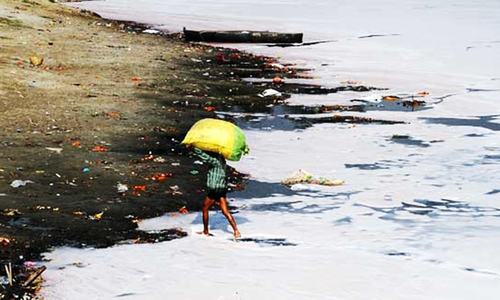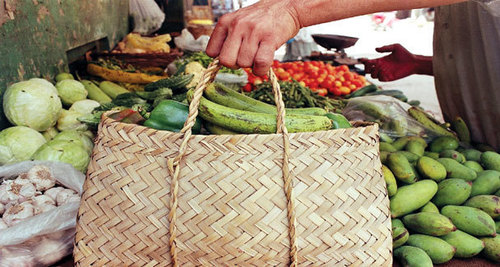ISLAMABAD: For over three years now, a vacant patch of land in Sector I-12 has served as the repository for all of the capital’s garbage. For the city’s planners, this was meant to be a stop-gap arrangement; the landfill was originally located in the Kuri area, but ended up being moved here.
If the wind is against you, you can smell the site before it comes into view. Located just off the I.J. Principal Road that divides Rawalpindi and Islamabad, the dump covers an area the size of one sub-sector, roughly where the I-12/1 neighbourhood should have been located.
Bedford lorries and newer-model dumper trucks wind their way down the dusty path leading to the heart of the landfill. Standing on a small mound of dirt and trash, waving off buzzing flies, midges and other sundry bugs, a municipal worker makes an entry in his notebook for every load of rubbish that ends up here.
Further afield, sanitary and municipal workers offload the waste. Be it human, animal or plant; metal, plastic, glass or porcelain — everything comes here. It is then sorted by local scavengers; the kabariye, who make a living separating recyclable items from the rest.
As I scan this vast field of refuse, all I see is a tragic-yet-routine tale of civic negligence, of waste being buried blindly, no matter what the environmental consequence.
But this festering Petri dish of a garbage disposal site has proven to be just as significant for a handful of scientists and academics from the Quaid-i-Azam University (QAU) as the neglected Penicillin cultures in his laboratory were for the British scientist Dr Alexander Fleming.
“Prof Safia Ahmed, Prof Fariha Hasan, Dr M. Ishtiaq Ali and I started working on the biodegradation of plastics at our microbiology research laboratory in 2002,” says Dr Aamer Ali Shah, one of the co-authors of a research paper that recently caused a stir in the scientific community by revealing the discovery of a fungus that is able to utilise plastic polymers as the source of its food.
The paper, which bears the otherwise dull title ‘Biodegradation of polyester polyurethane by Aspergillus tubingensis’, actually outlines a groundbreaking discovery; confirming the existence of naturally-occurring fungi that have the ability to perform “bio-degradation and bio-remediation of pollutants in soil or wastewater”.
“This organism was isolated from soil and/or plastic samples collected from the I-12 garbage dumping site,” says Dr Shah, explaining that researchers took topsoil and water samples from the landfill.
For anyone even remotely familiar with humanity’s growing plastic problem, this is nothing short of a “Eureka!” moment. A recent study by the University of California estimates that our civilisation has produced over nine billion tonnes of plastic, most of which is conventionally thought to be non-biodegradable.
But this discovery could change all of that. “If we get the right resources and funds, we would be able to establish an actual plastic degrading facility within three to five years,” Dr Shah maintains.
According to the scientists, the Aspergillus microbes were isolated in a laboratory and provided the right environmental conditions (such as temperature, pH, time, nutrients, etc) so that it would degrade polymers.
What has been observed is that the micro-organisms break down plastics in two ways. They can either attach themselves to the surface of the plastic to form a bio-film, releasing enzymes that dissolve the polymer, or penetrate it mechanically in order to ‘digest’ it.
It is a slow but naturally-occurring process, one that is not visible to the naked eye. “Most synthetic plastics are produced from non-renewable petrochemical-based raw materials, making them resistant to degradation in the environment.”
During the course of their work, the team at QAU has also been keeping tabs on the toxicity of the by-products formed during this process.
“Pollutants that only degrade partially can sometimes become more toxic than the parent compound,” he says, explaining how polyvinyl chloride (PVC) can partially degrade to vinyl chloride, which is quite toxic.
In an ideal situation, the microorganisms will be able to break down these complex compounds into water and carbon dioxide, achieving their complete bio-degradation.
Given the import of what they have discovered, the scientists are hopeful: “We have done these experiments in our laboratories using whatever resources were available to us. We have now reached a stage where we can apply these micro-organisms in the field, but for that we need more resources.”
And those resources cannot come too soon. According to the foreman of the I-12 landfill, the site cannot take more than a few more months’ worth of trash.
“There used to be great big depressions in the ground here, which have now been completely filled up with garbage,” he says, pointing to the horizon as a truckload of dirt is deposited on top of a pile of refuse and flattened by earth-moving machines.
Once space runs out, the site will have to be relocated yet again. Unless a permanent solution is found, our civic managers may remain content to bury their problems in this and other landfills like it.
Kashif Abbasi also contributed to this report
Published in Dawn, October 10th, 2017
















































